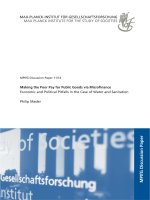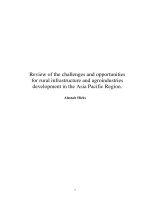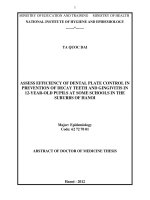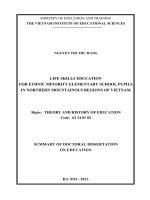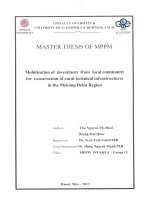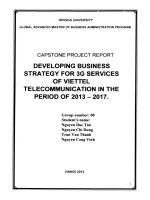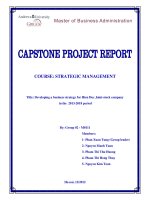Public service ethics education for trainees at provincial political schools in the northern mountainous region
Bạn đang xem bản rút gọn của tài liệu. Xem và tải ngay bản đầy đủ của tài liệu tại đây (233.87 KB, 27 trang )
MINISTRY OF EDUCATION AND TRAINING
THAI NGUYEN UNIVERSITY
HUA THI KIEU HOA
PUBLIC SERVICE ETHICS EDUCATION FOR TRAINEES
AT PROVINCIAL POLITICAL SCHOOLS IN THE
NORTHERN MOUNTAINOUS REGION
Speciality: Theory and History of Education
Code: 62.14.01.02
A SUMMARY OF
DOCTORAL DISSERTATION OF SCIENCE EDUCATION
THAI NGUYEN-2015
The dissertation is completed in:
COLLEGE OF EDUCATION-THAI NGUYEN UNIVERSITY
Scientific supervisor: Assoc. Prof, Dr. Tran Thi Tuyet Oanh,
Ph.D., Ha Noi University of Educaion.
Examiner 1:
Examiner 2:
Examiner 3:
The dissertation will be defended before the Dissertation
Committee of the University meeting at: COLLEGE OF
EDUCATION -THAI NGUYEN UNIVERSITY
At ,……… 2015
LIST OF PUBLISHED WORKS RELATED
TO DISSERTATION
1. Hua Thi Kieu Hoa (2012), "integrating public service ethics
education content in training programs of intermediate
administrative-political argument", Journal of Education, Ministry
of education and training, instalment 2, October 2012, pp. 23-24.
2. Hua Thi Kieu Hoa (2012), "Constructing and using public service
situations in teaching at provincial political schools at present",
Journal of Science technology, Thai Nguyen University, volume
98, October 2012, pp.103-106.
3. Hua Thi Kieu Hoa (2013), "public service ethics education for
trainees at provincial political schools at present", Journal of
Education, Ministry of education and training, instalment 2,
October 2013, pp. 27-28.
4. Hua Thi Kieu Hoa (2013), the "Innovating the teaching program
content of intermediate administrative-political argumen in the
direction of strengthening the public service ethics education for
trainees", Journal of Science education, Ministry of education and
training, volume 99, December 2013 pp. 41-44.
5. Hua Thi Kieu Hoa (2015), "orienting public service ethics
education for for trainees at provincial political schools at
present", Journal of State Organization, Ministry of Interior, May
2015, pp. 41-43.
1
PREAMBLE
1. Urgency of theme
For the official and public servants, ethics is the root and the
foundation to decide all matters related to the quality of public
service enforcement; Uncle Ho taught"a person who has talent
without virtue is useless, but it is difficult to do everything who has
virtue without talent".
Public service ethics of officials and public servants is formed and
developed which is a long constant continuous process, includes the
objective influence and the subjective impact of the whole society. In
the social impacts affecting public service ethics education and
training, there are the impacts of schools, unions, family, colleagues,
group of friends, cultural and educational agencies outside schools,
mass media agencies in which the schools is important factor in
public service ethics education.
The provincial political schools is the center of coordinating,
leading thought and political education, is an important link in the
process of education and public service ethics training for official and
public servants. There for, The provincial political schools are
specialized State agencies in charge of the education of the Party,
under the tight direction leadership of the Party, hold the opinion and
way of socialist education and have expert team specialized pedagogy.
For the above reasons, we choose"public service ethics education
for trainees at provincial political schools in the northern
mountainous religion"as the theme of dissertation.
2. Purpose of research
Studying public service ethics, public service ethics education and
practice of public service ethics education in the training process at
provincial political school, basing on which to put forward public
service ethics educational measures for trainees at provincial political
schools, contribute to improve the quality of education and training
of provincial political schools and public service ethics of officials
and public servants who are studying at school.
3. Subject and object of research
3.1. Subject of research
The process of the public service ethics education for trainees in
the training process at provincial political school.
2
3.2. Object of research
The relationship between the training process with public service
ethics education for trainees of provincial political school; measures
of public service ethics education for trainees at provincial political
schools in the northern mountainous region
4. Scientific hypothesis
The training process at the provincial political schools is one of
the important ways to influence the public service ethics of trainees
who are officials and public servants, are studying at the school. If
measures of public service ethics education are identified through
teaching activities, practice activities, practice of solving public
service situation, it will enhance the effect of public service ethics
education for trainees of provincial political schools, contribute to
improve the quality of local officials and public servants.
5. Task of research
Construct the basis of arguments about the public service ethics
education for for trainees of provincial political schools.
Construct the system of the public service ethics qualities which
need to be educated for trainees of provincial political schools.
Survey and value the actual situation of public service ethics
education for for trainees at provincial political schools in the
northern mountainous region.
Proposed measures for public service ethics education for trainees
of provincial political schools and experiment.
6. Limitation of research scope
Research the public service ethics education through the training
process at provincial political schools.
Research trainees of the intermediate political-administrative
The research was done at the political schools of Thai Nguyen, Bac
Giang, Yen Bai and Son La province.
Survey data is taken from 2011 to 2014.
7. Methodology and research methods
7.1. Methodology
The theme of dissertation bases on some approach methods such
as: value approach and system approach.
7.2. Research methods
The dissertation uses the group of theoretical research methods; the
practical research method and the method using statistical mathematics.
3
8. Protected points of dissertation
The public service ethics of official and public servants is formed
and developed through a long process with a lot of impacts in the
different stages. The training at provincial political schools is a
process, a period which affects drastically public service ethics
education and training of officials and public servants.
Public service ethics education for trainees at provincial political
schools is the particular educational process that need to impact on
cognitive factors, will and behavior through the training and diversified
exchange activities of learners in order to create the foundation of
awareness and show the right public service ethical behavior.
Through the process of training at provincial political schools,
learners will develope awareness, will and public service ethical
behaviour if there are measures which affect learners such as: impact
to their awareness about the public service ethics ; organize to pratise
of solving public service situations; organize movements, practical
experience in learning process at school.
9. New contribution of dissertation
Systematize and deepen the basis of arguments about the public
service ethics education for trainees in the training process at
provincial political schools. The system is the public service ethical
standards which needs to educate trainees through the training
process at provincial political schools.
Estimate the reality of public service ethics education for trainees
in the training process, at provincial political schools in the northern
mountainous region nowadays, to make the base practices for
proposed measures.
Propose public service ethics educational measures for trainees in
training process at provincial political schools in the northern
mountainous region
10. Structure of dissertation
Excepting introduction and conclusion, the bibliography of
reference document includes 3chapters and appendices.
Chapter 1: argument basis of public service ethics education for
trainees in the training process at provincial political schools.
Chapter 2: practical basis of public service ethics education for trainees
at provincial political schools in the northern mountainous region.
4
Chapter 3: public service ethics educational measures for for
trainees at provincial political schools in the northern mountainous
region and experiment.
Chapter 1
ARGUMENT BASIS OF PUBLIC SERVICE ETHICS
EDUCATION FOR TRAINEES IN THE TRAINING PROCESS
AT PROVINCIAL POLITICAL SCHOOLS.
1.1. Overviewing of research problems
1.1.1.Research on ethics education
In terms of the argument as well as the practice of ethics
educational research are interested, examined, valued through
different ways by many scholars and has got an important
contribution to this field of research such as: "Some problems of
education and science education"by Pham Minh Hac, 1986; "Value-
orient personal value and value education"of Nguyen Quang Uan,
Nguyen Thac, Mac Van Trang, 1995; "Some problems of lifestyle,
ethics, social value standards" of Huynh Thai Vinh, 2001;
1.1.2. Research on education for officials and public servants
Research on public service ethics and ethics training of officials
and public servants
There are researches such as "Impact of ethics and public service:
Prospect of South Africa"of Raga, Kishore, 2005; "About morality"
of Ho Chi Minh, 1993; "Ethics in public service" of To Tu Ha, Tran
Anh Tuan, Nguyen Thi Kim Thao, 2002; "Constructing the ethics of
Vietnamese officials and public servants in the period to promote
industrialization, modernization and international integration" of Bui
The Vinh, 2003; "Communication skills in the administration" of Mai
Huu Khue, 1997;
Research on training officials and public servants and public
service ethics education for trainees at provincial political schools
Training activities for officials and public servants in the world is
very different and diversified in each country but in order to enhance
the capacity, ethical qualities of human resources, contributing to
construct an explicit modern public administration. The best interest
is officials and public servants training activities in China and public
servants training types in some countries as France and South Korea
5
in the research "Teaching method at the schools of the Communist
Party in China" of Vo Thi Mai, 2007; "Human resource management
experience in Korea and China" of Thu Huyen, 2007; …
In Vietnam, many researchers analyze the situation and propose
solutions to improve the quality of training officials and public
servants as: "Reform the training process for officials and public
servants to improve the capacity of public enforcement service" of
Ngo Thanh Can, 2014; "Thought about officials and public servants
ethics education" by Tran Minh To, 2014.
Up to now, about the research of public service ethics education
for officials and public servants through training and retraining at
political provincial schools, there is no one, some relevant studies as:
"Innovation in political - ideological education for officials, party
members in the grassroots" of Vu Ngoc Am, 2003; "Ideology- culture
of district level" of Dao Duy Quat, Hanoi 2003; "Management model
of training in institutions of district level in the current period" of
Dang Thi Bich Lien, 2009; "Survey, assessing the situation and
effectiveness of grassroots officials who were trained at provincial
politics schools in the period 1997 - 2002, which recommended
raising the quality of training and retraining in the future" by Nguyen
Trong Chinh, 2002; "Strengthening friendly convenient
administrative communication between officials, public servants and
citizens in the locality Commune People’s Commitee of Dong Xoai
Town" by Nguyen Thanh Thuyen, 2002
Through above researches we can realize that:
Firstly, ethics education in general; many authors and researches
mentioned ethics education for officials and public servants. However,
studying at provincial political schools is interested little.
Secondly, there are some researches proposed solutions to
enhance public service ethics in order to perform some Public
Administrative Reform contents in Vietnam, the results were often
big oriented solutions.
Thirdly, there are some studies affir that ethics education needs by
many ways; provincial political schools not only provide the content
of political theory but also has an important role in educating the
public service ethics for officials and public servants. However, there
is no study which has ever established particular systematic measures
of ethics education for officials and public servants.
6
1.2. Some basic concepts of theme
1.2.1. Public service ethics
Public service ethics is the system of rules which regulates
knowledge, attitude, behavior of officers and civil servants in duty
and public service in oder to build a modern formal Administration
for the target rich people, powerful country, social justice,
democracy, civilization.
1.2.2. Public service ethics education
Ethics education is the process of education organization at
schools (society) aims to help learners (students) who have the right
mindset, knowing standards, value systems. Formation of emotions,
sentiment, moral belief, practising, having the habits, behavior
consistent with the objective values of the society requires , self -
improve the quality of personality.
The public service ethics education for trainees at provincial
political schools is a purposeful impact process, plan of the subject
education aims to help trainees who are officials and public servants
have the right mindset about rules, ethics standards in enforcement of
the public service; turn the ethics standards, rules into the habits,
behavior in public service activities.
1.2.3 Training officials and public servants
Training officials and public servants is the organization for officials
and public servants to learn, raise the level of expertise, professional
competence, tasks, public service, respones the human resource of the
organization and builds a modern formal Administration.
1.3. Public service ethics basis of officials and public servants
1.3.1. Basic elements constitute public service ethics
Includes personal ethics, social ethics, professional ethics of
officials and public service and the legal regulations for them when
they make the service enforcement.
1.3.2. Process of establishment and development of public service ethics
The process of establishment and development of public service
ethics of officials and public servants is reviewed by two approaches:
Firstly, the establishment and development of public service ethics of
officials and public servants is a process of cognitive development
from spontaneity (personal ethics, social ethics) to institutionalizing
the laws of the State and finally raises the ethical voluntary standard.
Secondly, the process of establishment and development of public
7
service ethics of officials and public servants undergoes three
processes: the training process at professional schools before being
officials and public servants; the process of experience in public
service practice; the process of training and upgrading of officials
and public servants.
1.3.3. Factors affect public service ethics
There are many factors affecting the public service ethics of
officials and public servants today, those are: the condition of social-
economic development of the country; the value of traditional culture
of the nation; the law and the implementation of law; the role of
administrative agencies; the education and training activities of the
school; the level level, cognitive ability and cultivate awareness
training service ethics of officials and public servants.
1.4. Educating the public service ethics for trainees who are officials
and public servants in the course of training at provincial political
school
1.4.1. Characteristics of trainees of provincial political school
Trainees of provincial political schools are mainly of the most
important fficials of communes, towns, wards and units; are officials
and public servants of facility, departments, districts, cities, towns
are adults who were trained in a professional school.
1.4.2. Training activities at provincial political schools and public
service ethics practice of trainees
Through improving the level of political argument, trainees will
enhance scientific thinking skills, capacity of operational public
service practice.
On the basis of advanced level of political argument, trainees have
the ability to conceive correctly the way as well as the political goals
of the party, apply it effectively on specific conditions in public
service activities of their local
1.4.3. Public service ethics educational goals for trainees
About the awareness: Help trainees realize correctly about public
service ethics; about basic skills to identify, evaluate, practise public
service ethics; about revolutionary tasks; attitude, responsibility for
the job, with colleagues and people.
8
About the emotional attitude: help trainees have the proper
attitude with ethical behaviour in duty; try their best for the job.
About the behavior: execute regulations of the law; rules and
regulations of agency and unit in public service activities. Having
behavior which is available with ethical standards, having pure
healthy social relations, closing to the people.
1.4.4. Content and method of public service ethics education for trainees
The content of public service ethics education includes:
educational awareness of politics, awareness of responsibility, ethical
behavior, legal awareness, personal awareness about public service
ethics; training the ethical culture, public service ethics emotion.
The method of public service ethics education includes: method
requires education, method of work, method of creating public social
opinion, method of creating educational sittuation, the method of
conversation, method of arguments, method sets the example,
method of emulation, reward method, method for punishment.
1.4.5. Ways to educate the public service ethics for trainees
Public service ethics education is a division of the educational
process, it is conducted with the basic ways: through the combination
of forces to join the public service ethics education; through teaching
activities; through organizing rich and diverse activities for
trainees; through collective activities; through practical experience in
local, units; self cultivation and education of trainees.
1.4.6. Requirements in public service ethics education for trainees
Ensure the consistence between the science, the education and the
political orientation; the unity between the theory and the
practice; the unity between the consciousness and actions of
participants in education; the unity between the role of the subject
education and the voluntary role, positive, independent of
trainees; the education must impact on perception, emotion, behavior.
Conclusion of Chapter 1.
Public service ethics of officials and public servants is formed by
the requirement for personal ethics, social ethics of officials and
public servants and the legal regulation of officials and public
servants when making the enforcement service. The process of
formation and development of public service ethics associated with
the training process at professional school, the process of public
9
service practical experience and the process of training officials and
public servants.
The research on public service ethics, process of public service
ethics education at provincial political schools has contributed to
affirm that the public service ethics is an indispensable quality of
officials and public servants; public service ethics education needs
through many ways, includes training activities of school; provincial
political schools not only offer the content of political arguments but
also have an important role in the public service ethics education for
officials and public servants.
The argumental basis of research results presented in Chapter 1
which is the base to survey, research and propose measures of public
service ethics education for for trainees at provincial political schools
in the northern mountainous region nowadays.
Chapter 2
PRACTICAL BASIS OF PUBLIC SERVICE ETHICS
EDUCATION FOR TRAINEES AT PROVINCIAL
POLITICAL SCHOOLS IN THE NORTHERN
MOUNTAINOUS REGION
2.1. Public service ethics standards of officials and public
servants nowadays
2.1.1. Base to determine public service ethics standard
Ho Chi Minh thought and issues related to public service ethics.
Legal documents of Vietnam expressed public service ethics.
Public service ethics regulations of some countries on the world
2.1.2. Public service ethics standards of officials and public
servants
- Loyalty to the fatherland.
- Practising strictly the law relating to public service
- Conscious organization, discipline, responsibility in work.
- Making good relationships with superiors, subordinates and co-
workers.
- Close contact with the people.
- Using common transports by regulation of the State.
10
- Healthy living, honest, simple, modest, saving, upright, public
spirit and selflessness.
2.2. Generalizing training activities for officials and public servants
at provincial political schools in the northern mountainous region
2.2.1. Conditions of nature and society in the northern mountainous
region
The northern mountainous region is a geographical location of
strategic importance on politics, security, defence, and is important to
economic-culture-society development of the country today.
2.2.2. Overviewing the training and upgrading at provincial
political schools in the northern mountainous region
On average per year each provincial political schools in the
northern mountainous region trains from 2,500 to 3,500 trainees; the
quality of training is increased more and more. The number of
graduated trainees rates yearly the best 20-30%, good 50-60%,
average 5-10%.
2.3. Actual situation of public service ethics educational training
for trainees at provincial political schools in the northern
mountainous region
2.3.1. Overviewing actual situation survey
2.3.1.1. Survey purpose
Estimating content, method of public service ethics education for
for trainees at provincial political schools in the northern
mountainous region and determining the cause of actual situation.
2.3.1.2. Survey object
Investigating managers and trainers who work at provincial
political schools with the number of surveys is 100 people.
Investigating trainees who study at provincial political schools with
the number of surveys is 88 people.
2.3.1.3. Content survey
The actual situation knowledge about public service ethics and
the public service ethics education for trainees at provincial
political schools.
The actual situation of content, methods, form of public service
ethics education of trainees at provincial political schools
Estimating advantages, limitations and causes of the actual situation
11
of public service ethics education for trainees at provincial political
schools at present.
2.3.1.4. Survey methods and results treating
Using the method of investigation, observation, conversation,
interview, experience summarization, mathematical methods.
2.3.2. Results of actual situation survey
2.3.2.1. Awareness actual situation about public service ethics
Basing on results of investigating trainees who are officials and
public servants attending at provincial political schools in the
northern mountainous region, which shows the understanding of
trainees is quite specific, but is mostly based on the deduction from
knowledge and practical experience, absolutely non science.
2.3.2.2. Awareness actual situation of public service ethics education
for trainees at provincial political schools
The public service ethics education for trainees at provincial
political schools needs to carry out in many places as: in
agencies; society; at training facilities, at everywhere, which
emphasizes the important role of at provincial political schools in
enhancing the quality of local officials and public servants.
2.3.2.3. Actual situation of public service ethics educational content
for for trainees at provincial political schools
The implementational level of the educational content of the
public service ethics for trainees has been interested by provincial
political schools, especially educational content of political
ideology. The ethics content relates directly to the public service
activities of officials and public servants which are not yet interested
educating moderately by schools
2.3.2.4. Actual situation of public service ethics educational methods
for trainees at provincial political schools
Method using of public service ethics education for trainees at
were carried out at provincial political schools but uneven. There are
methods which have high result in public service ethics education
have not yet to be implemented effectively, such as:"the method of
creating the public service ethical situations to be resolved by
trainees","the discussion method”.
12
2.3.2.5. Actual situation of public service ethics educational form
(way) for trainees at provincial political schools
Public service ethics educational ways for trainees of provincial
political schools was carried out here but mainly"educating through
subjects teaching activities in training and retraining
program","through self-discipline, self-cultivation and self-education
of trainees","educating through practical experience in local". These
are essential activities and in training programs. And about
educational ways which are evaluated essential in the public service
ethics education for trainees, are not caried out immodraely as forms
of"educating through a combination of public service ethics
educational force","educating through organizing varied activities for
trainees","educating through group activities","educatiing through
subject teaching about public service ethics education".
2.4.2.6. Public service ethics educational results for for trainees at
provincial political schools
Provincial political schools is now mainly interested in political
theory teaching without focuses on public service ethics practice,
routine ethics deed of officials and public servants in public service
activities for trainees who are officials and public servants studying
at school. On the other hand, content, programs, training and
retraining of provincial political schools have not any subject, any
topic of public service ethics.
To evaluate the results of public service ethics education for
trainees of provincial political schools, we had an interview for
comments of some management officials in local; trainers and
trainees at provincial political schools.We obtained the following
result: The majority opinions show that the quality and efficiency of
public service ethics education for trainees through training activities
of provincial political schools was only at the medium level
2.3.2.7. Factors affect public service ethics education for for trainees
at provincial political schools
Ethics education activities for trainees at provincial political
schools are controled by factors such as: changes on the world and
current situation of country; economic- society characteristics of
local; awareness of the importance of public service ethics
education; content learning programs;collaboration between training
13
institutions and the sending unit training; forms of public service
ethics education at schools; qualifications and capacity of
trainers; consciousness, learning attitude of trainees; emulation bonus
activity; group activities; activeness of trainees in public service
ethics pratice.
Of above factors, subjective factors are evaluated with the highest
impact on the quality of public service ethics education for trainees at
provincial political schools.
2.3.3. Estimation of actual situation
2.3.3.1. Advantages
In general trainers and trainees at provincial political schools have
proper awareness about public service ethics; role and position of
public service ethics education for trainees during training and
retraining at school. So, schools had positively some measures of
public service ethics education to enhance the educational quality for
officials and public servants in the current period.
2.3.3.2. Problems should be fixed and completed
In training activities, provincial political schools is now mainly
interested in political theory teaching without focuses on public
service ethics practice, routine ethics deed of officials and public
servants in public service activities for trainees who are officials and
public servants studying at school.
Public service ethics education for trainees at political provincial
schools have not conducted; public service ethics educational
content, method, form are not mentioned particularly and
systematicaly in training process at schools.
2.3.3.3.Cause of actual situation
There are many causes that affect the quality of public service
ethics education for trainees at provincial political schools in the
northern mountainous region, of which the most basic cause is dued
to the content of the learning program (now the public service ethics
content does not yet become subject, independent theme in training
program of school); the coordination is not yet synchronized between
the training institutions and the sending unit training; the positiveness
of trainees in public service ethics pratice was not much; the form of
14
public service ethics education at schools also has certain limitations;
have not found a system synchronous education measures; have not
focused to exploit the peculiar strengths to education effectively
public service ethics for trainees.
Conclusion of Chapter 2
Public service ethics is an important part of the personal qualities
of officers and pulic servants. Ethics is formed by value systems,
different ethics standards; the formation and development of the
public service ethics were through certain stages, suffered the impact
of subjective and objective various factors, including training time at
provincial political schools. Learning time at provincial political
schools is the stage which trainees are equipped knowledge of the
theory and practice; help for each trainees to have good
accomplishment and tasks of official and public servant in public
service practical activities.
The actual situation of public service ethics education for trainees
at provincial political schools in the northern mountainous region has
now many advantages but has problems which should be fixed,
completed. Majority trainees at provincial political schools are officer
and public servants who have more knowledge, skills and public
service ethics qualities. So, in training process of public service
ethics education for trainees, provincial political schools need to
improve quality in all aspects, in that focus particularly content,
training program; educational forms; educational methods.
The above comprehended practical issues and analysed arguments
are the basis to propose some measures of public service ethics
education for trainees at provicial political schools nowadays in order
to ensure reality and bring high efficiency, contribute to improve the
quality of training for officials and public servants of provincial
political schools in the northern mountainous region, overcome the
above limit.
15
Chapter 3
PUBLIC SERVICE ETHICS EDUCATIONAL MEASURE
FOR TRAINEES AT PROVINCIAL POLITICAL SCHOOLS
IN THE NORTHERN MOUNTAINOUS REGION AND
EMPIRIMENT
3.1. Principles of proposed measure
3.1.1. Ensuring to respone political goals of the Vietnam State
Built educational measures are suitable to the opinion of the Party
and the State about ethics education for officials and public servants
in the trade economic period of the Socialist orientation; focus on
contents, requirements of officials and public servants Law in
2008; Decree No. 18/2010/De-PM, published 5/3/2010 of the Prime
Minister"about training officials and public servants"and the
Resolution of The Executive Committee’s Conference of the Central
Communist Party, course XI, 2014 about"build and develop the
culture and people of Vietnam to response the sustainable
development requirement of the country".
3.1.2. Ensuring to be consistent with training requirement at
provincial political schools
Built educational measures are based on the training requirements
of the provincial political schools. From which, ensuring the target of
building and development modern officials and public servants,
guarantee argument and practice in the training and upgrading of the
provincial political school; create the consistency between the
training process at schools, the social education and the self-
educational process of trainees; make trainees from the proper
awareness about the role of the public service ethics education to
coordinate actively the subject education in practising, improving
ethics in the public service enforcement and life.
3.1.3. Ensuring to be consistent with the learning characteristics
and conditions of trainees
The construction and implementation of measures ensure that the
process of public service ethics education at provincial political
schools is suitable for trainees who are adults. Therefore, should the
choice of approach and method of education tailored to overcome the
weak points and promote the strengths of the students; the choice of
16
educational content related to experiences and the problems that
students have and will meet in the practices in local public service unit.
The construction and implementat5on of measures must ensure
that the process of moral education at schools of politics of the fit
student audience is adults, adults. Therefore, should choose suitable
approach and educational methods to overcome the weak points and
promote the strengths of trainees; choose educational content related
to experiences and the problems that trainees faced and will face in
practical public service activities in local.
3.1.4. Ensuring to be suitable for the content of public service
ethics standards
The public service ethics standard is the value measure of each
officials and public servants, is the basis on which managers
determine activities, adjust the awareness, attitudes and ethics
behavior of officials and public servants to suit the purpose and tasks
of the pulic service activity. Therefore, measures of public service
ethics education for trainees of provincial political schools must to be
suitable for the content of public service ethics standards.
3.1.5. Ensuring the logic system
The proposed measures must be an organic parts of the education
and training process in general and the process of public service
ethics education in particular; must express the comprehensive,
specific, historic, sync system. These measures must be sync together
and have the same objective aimed at the public service ethics
education, must 5originate and implement the measures directed on
all sides, every stitching, the training process at schools but must
conform to the practical requirements of local and needs of each
object in each of different stages.
3.2. Measures of public service ethics education for trainees at
political provincial schools in the nothern moutainous region
3.2.1. Integrating content of public service ethics education in
teaching process
Public service ethics education through subjects of the
administrative-political argument makes the target of ethics eduation
for officials and public servants. In which, knowledge of lesson is
before, available and fixed; public service ethics knowledge is chosen
to put on and it is later, that can change. Depending on specific goals,
17
teachers can use many forms of integrating different in lessons, units,
in order to help trainees always have the considerations, lessons for
themself about ethics requirements when take the public service
enforcement
Integrating content of public service ethics education in teaching
process should be carried out according to following steps:
-Step 1: Analyse the academic program to determine the
integrating content for the mainstream school.
-Step 2: Determine the goal of lecture
-Step 3: Collect and treat documents
-Step 4: Design the lecture
To make integrating public service ethics education content in
teaching process, it should be ensured following requirements:
- Officers and trainers of schools have consensus, unanimous and
determine to make the showed resolution of the Party Committee and
Managing Board.
- Lecturer of all subjects select and integrate the content of public
service ethics education in their subjects.
- Reinforce funding, equipment and essential materials to serve
the learning and teaching subjects in program.
3.2.2. Constructing and using the public service situation in teaching
The public service situation is objective real events that take place
extraordinarily and related to the responsible management of the
State’s administrative agencies, forces these agencies which must have
suitable solutions. Giving the way of building the public service
situation which is consistent with the pratical content of lesson in
training programs of intermediate administrative-political argument,
and organizing trainees solve the public service situation that will
enhance applying theory into practice, thereby improve the awareness,
adjust the public service ethics behavior and attitude for trainees.
Building and using the public service situation in teaching should
be carried out according to following steps:
-Step 1: Study basic characteristics of public service situation
-Step 2: Determine the content of public service situation
-Step 3: Construct public service situation in political theory
teaching
18
-Step 4: Organize solve public service situations
To make building and using public service situations in teaching,
it should be ensured following requirements:
-Establish collections, draft the public service situations for
learning, public service ethics education for trainees at provincial
political schools in the northern mountainous region
- Trainers reinforce train the skills of analysing, synthetizing and
resolving situations to help trainees adapt to the teaching which
associates between argument and practical tasks of officials and
public servants in local.
3.2.3. Organizing extracurricular activities of academic part, seminar
according to the theme of public service ethics education content
By organizing extracurricular activities of academic part of in
programs of intermediate administrative-political argument will
contribute to expande and deepen the content of subjects; add the
problem has not yet been put out in mainstream programs; promote
the positiveness, activeness in public service ethics education at
provincial political schools.
Seminars creat the frank conversations between members of
collective about the news happening in practice of public service
enforcement in local; help trainees to exchange together, discuss,
answers urgent matters, public service awkward situations, specific
events, through which, it will create a good public opinion to adjust
public service ethics awareness of each individual.
Organizing extracurricular activities of academic part, seminar
according to the theme of public service ethics education content
should be carried out according to following steps:
Organizing extracurricular activities of academic part
-Step 1: Defining extracurricular activities of academic part based
on its content
Step 2: Organizing extracurricular activities of academic part
Seminar according to the theme of public service ethics education content
-Step 1: Choosing content to organize seminar
-Step 2: Organizing seminar
Organizing extracurricular activities of academic part, seminar
according to the theme of public service ethics education content
should be ensured following requirements:
19
-Training in order to trainers of schools have skills of organizing
extracurricular activities and organizing seminar according to the
theme of public service ethics education content.
-Mobilizing resources to organize extracurricular activities and
organized seminar according to the theme of public service ethics
education content.
3.2.4. Constructing the subject of "public service ethics" to teach in
training programs at provincial political school
Constructing the subject of"public service ethics"to teach in
training programs of intermediate administrative-political argument
is necessary and feasible in training at provincial political school;
stimulates the interest, positiveness, activeness and self education of
trainees, combines pratice and theory.
Constructing the subject of"public service ethics"to teach in
training programs at provincial political schools should be carried out
according to following steps:
-Step 1: Define basic characteristics of the subject
-Step 2: Identify principle of subject construction
-Step 3: Wite the subject
-Step 4: Contribute subject content
-Step 5: Organize subject teaching
-Step 6: Recapitulate opinions and complete the subject
Constructing the subject of"public service ethics"to teach in
training programs at provincial political schools should be ensured
following requirements:
-The managing board of schools establishes Team responsible for
compiling serves for learning, educating public service ethics for
trainees at provincial political school.
-The building should have the consistency of the managing board
of schools and expertise faculties. Subject content in teaching should
be through the school's Science Council and receive the unanimity,
support of superior agency
3.2.5. Educating training needs of the public service ethics through
the emulation movement and actual experience activities
Organizing the emulation movement, actual experience activities
help trainees to build the motive, the study purpose, proper
exercise; on the basis promoted highly ability of self-studying, self-
training to improve in the public service ethics.
20
Educating training needs of public service ethics for trainees of
provincial political schools through movement, activities of actual
experience, create the consistency between the training process of
schools and the activity of self- improving of each
individual. Helping students search for the truth and remove the
personal motives which is not suitable for the standard of officials
and public servants; firm, control confidently and adjust its behavior,
consciousness in practical activities to develop the public service
ethics of individual.
Organizing movement and actual experience activities needs to
perform following contents:
Organizing emulation movements
-Step 1: define the movement based on forms, goals, training content
-Step 2: organize emulation movements
Organizing practical experience activities
-Step 1: Prepare activities
-Step 2: Carry out activities
-Step 3: Estimate activities
The Organization of the movement, the actual experience of
activities should be ensured the following requirements:
- Leadership of schools needs to master local resources to know
how to exploit and organize the emulation movement, experience
activities which are practical and effective. At the same time
mastering financial rules, reasonable budget balance to set aside a
section for public service ethics education for trainees at provincial
political schools
-Promote self-reliance, self-control; exploit the ready potential of
school’s traineers. Built up the reputation of school, create the
confidence for the institutions, departments, unions and local people.
3.3. Relationship between measures and surveying the necessary,
the feasibility of measures
3.3.1. Relationship of all measures
Each measure has a certain role, functions in the support,
complement together and are aimed at the public service ethics
education for for trainees at provincial political schools.
3.3.2. Surveying the necessary, the feasibility of measures
The survey results confirmed that proposed measures have the
basis to apply into practice and have absolutely necessary and
21
feasibility in condition of provincial political schools in the northern
mountainous region.
3.4. Pedagogical experiment
3.4.1. General issues of pedagogical experiment
3.4.1.1. Purpose of experiment
In order to test the correctness of scientific assumptions and the
feasibility of proposed measures. Focusing experiment two key
breakthrough measures, those are: integrating measures of public
service ethics education content in the teaching process of
sections; organize extra curricular activities in school, seminar
according to the theme of public service ethics education content.
3.4.1.2. Object of experiment
The experiment was conducted at two provincial political schools
of Son La and Bac Giang from October, 2012 to August 2013. The
experimental subject is trainees of intermediate administrative-
political argument.
3.4.1.3. Content of experiment
Choosing the content through teaching activities, education in the
process of training to raise awareness about the ethics standards of
officials and public servants and practise activeness of cultivating
public service ethics for for trainees at provincial political schools to
carry out experiments.
3.4.1.4. Process of experiment
The experiment is carry out in 3 basic steps.
Step 1: Prepare the experiment
Step 2: Conduct the experimental impact
Step 3: Finish the experiment
3.4.1.5. Criteria and evaluating scale
Criteria 1: level of awareness of trainees about public service ethics
Criteria 2: emotion, attitude, excitement of trainees about public
service ethics
Criteria 3: Positiveness of practising public service ethics of trainees.
3.4.2. Analyse experimental results
The experimental results are analysed specificly both of
qualitative and quantitative aspects, reach the necessary
22
reliability; allow to confirm that proposed measures are
right. Through experiments, it showed that if we have actively,
boldly pedagogical implications as conducting experiments, it will
raise awareness about public service ethics standards and promote
positive practising public service ethics of trainees at provincial
political schools currently; contribute to train lecturers, public
servants who are"diligent"and"very good", respone the requirements
for improving the quality of education and training at provincial
political schools in the new situation. It can confirm that protect
points of fake dissertation have been determined to be right.
Conclusion of chapter 3.
Public service ethics education is the long, difficult, complicated
process; requires perseverance, effort, high positivenees of all
forces. That process should be regularly impacted on awareness,
feelings, and behaviors of trainees; need to base on the logic of the
educational process and characteristics of object to have suitable
educational impacts
On the basis of theory and practice, we proposed five measures of
public service ethics education for trainees at provincial political
schools in the northern mountainous region. Proposed educational
measures have dialectical relationships, impact, support each other to
create a consistent perfect whole in order to practise and develop
firmly public service ethics for trainees.
The experimental results are analysed specificly both of
qualitative and quantitative aspects, reach the necessary
reliability; allow to confirm that proposed measures are
right. Through experiments, it showed that if we have actively,
boldly pedagogical implications as conducting experiments, it will
raise awareness about public service ethics standards and promote
positive practising public service ethics of trainees at provincial
political schools currently; contribute to train lecturers, public
servants who are"diligent"and"very good", respone the requirements
for improving the quality of education and training at provincial
political schools in the new situation. It can confirm that protect
points of fake dissertation have been determined to be right.

